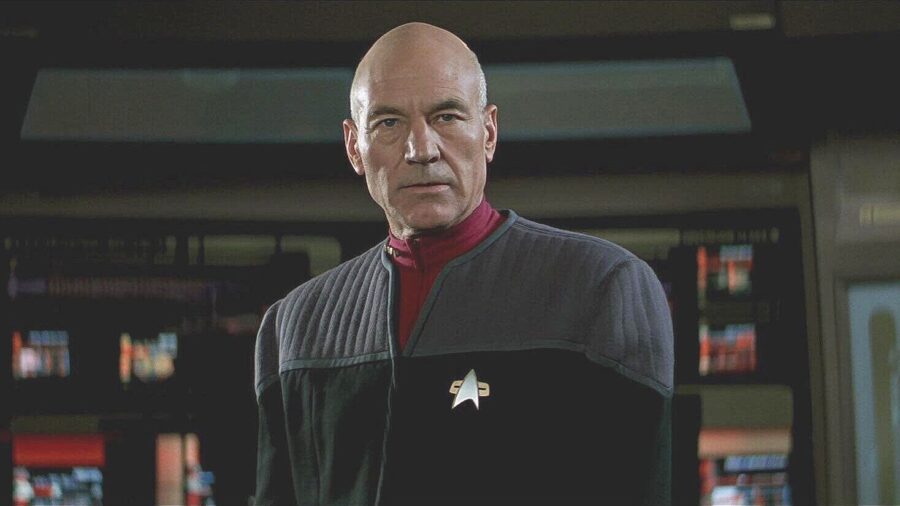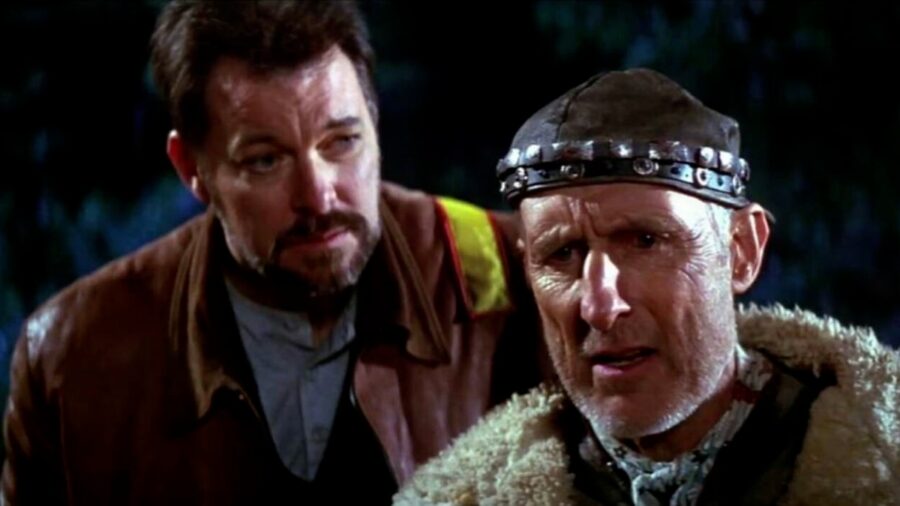Star Trek: First Contact Was A Gene Roddenberry Biopic?
Could Star Trek: First Contact have been a Sneaky Biopic?
This article is more than 2 years old

Fans can harbor some pretty crazy theories about films. There’s the theory that Titanic‘s Jack Dawson (Leonardo DiCaprio) is a time traveler, that Gene Wilder’s Willy Wonka is a serial killer, and even one that Macaulay Culkin’s inventive hero from Home Alone grew up to be the protagonist of the Saw films. A new theory posed by a podcaster isn’t quite as insane as some of those others, but it sounds like it at first. Writer and humorist Dave Schilling has put forth his theory that 1996’s Star Trek: First Contact is something of a sneaky biopic for Star Trek creator Gene Roddenberry.
Or, at least part of the film acts as tribute to Roddenberry, according to Schilling. The writer shared his theory on an episode of his podcast Galaxy Brains (via Polygon) while he and co-host Jonah Ray were joined by comedian and eminent nerd John Hodgman. Star Trek: First Contact came up in conversation because 2021 marked the film’s 25th anniversary, and Schilling shared his idea that Zefram Cochrane (James Cromwell) is actually meant to be a “stand-in” for Gene Roddenberry: “He says the words ‘Star Trek’ in the movie. He invents warp drive. He meets a Vulcan for the first time. He’s this volatile human being with a lot of flaws, who meets his very logical person, and they have a moment of understanding.”
In case you’re confused — in Star Trek: First Contact, the fan-favorite Trek villains the Borg go back in time to the 21st century in the hopes of stopping humanity’s first contact with Vulcans, thereby stopping the formation of the Federation and rendering all of its would-be member races much easier to assimilate. The Enterprise follows the Borg to the past and while Captain Picard (Patrick Stewart) leads the crew on the ship in their fight against the Borg, Will Riker (Jonathan Frakes) leads another part of the crew on Earth. There they help Zefram Cochrane — the inventor of the warp drive — complete his historic test flight to make sure everything unfolds as it should. But when the heroes find Cochrane, instead of the farseeing visionary they learned about in school, they find an alcoholic jerk who’s developing the warp drive to make himself rich.

The crew’s expectation of Cochrane vs the reality of the man in Star Trek: First Contact, says Schilling, mirrors the fan legends about Roddenberry and the facts: “Gene Roddenberry has been said by many people… that he was kind of a volatile, difficult man. And that’s kind of what Zefram Cochrane’s arc is. He starts off as this guy who’s just trying to make money and make a buck. Star Trek was a means to an end for Gene Roddenberry. But then it becomes this cultural phenomenon, and he changes the world in a lot of ways.”
Schilling’s co-host Jonah Ray expanded on the theory, bringing up the now either infamous or classic (depending on who you ask) “Get A Life!” skit William Shatner did in 1986 for Saturday Night Live. If you’re unfamiliar — after enduring ridiculous and mostly unanswerable questions from stereotypically portrayed man-child Trek fans, Shatner finally loses his cool and yells at them to “Get a life!” Ray said he always thinks about that skit while watching Star Trek: First Contact when Cochrane reacts negatively to Starfleet officers who treat him like a celebrity. It gets so bad, Cochrane actually runs away and Riker has to blast him with his phaser (set to stun) to get him back.
Dave Schilling’s theory has some merit, especially when you consider one of the most important parts of Star Trek: First Contact‘s plot — time. Gene Roddenberry passed away in 1991, leaving any Star Trek creatives who felt the need to to wrestle with their predecessor’s legacy on the big screen the freedom to do so. The film was also released two years after the publication of John Engel’s Gene Roddenberry: The Myth and the Man Behind Star Trek, in which the author earned the ire of Trek fans worldwide by discussing just how different Roddenberry was from many fans’ imaginations. Among some of the more inflammatory quotes was one from Spock actor Leonard Nimoy claiming that he never saw Roddenberry as “the decent, honorable humanist that he portrayed himself to be.”
By the way, agreeing with Schilling’s interpretation of Star Trek: First Contact — or even just admitting Schilling might make some good points — doesn’t necessarily mean you’re condemning the Trek creator. James Cromwell goes on to reprise his role as Zefram Cochrane in the 2001 premiere of the prequel series Star Trek: Enterprise. There we see that rather than remain a drunken curmudgeon, Cochrane has confronted his legacy and decided to embrace it.











